SFA University
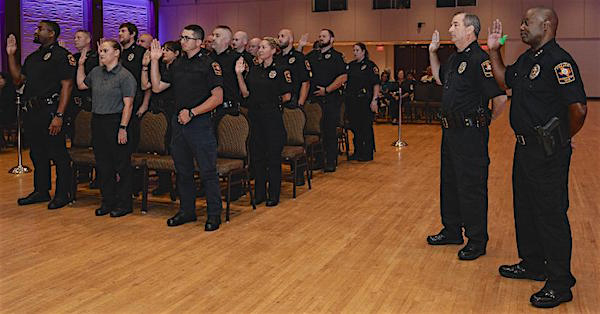
Officers of Stephen F. Austin State University’s police department take a formal oath for dual commission with The University of Texas System’s police force during a ceremony Monday in the Baker Pattillo Student Center.
July 10, 2023 - Officers of Stephen F. Austin State University’s police department received a dual commission with The University of Texas System’s police force during a ceremony Monday on the SFA campus.
The University Police Department officers became jointly commissioned as both SFA and UT System officers, which will hold until Sept. 1 when SFA officially becomes a member of the UT System. At that time, UPD officers will be commissioned only with the system, though their primary role will remain serving the SFA campus.
John Fields, SFA’s chief of police, said the department will continue to serve SFA and the campus community in the manner in which it has built its reputation — with professionalism and ethical decision-making.
Commissioning the officers into the UT System “will bring a sense of humanity to and a mutual respect with the campus community, which we see across the state already,” Michael J. Heidingsfield, UT System director of police, said during the Monday ceremony held in SFA’s Baker Pattillo Student Center Grand Ballroom. “SFA officers are motivated by the same things that motivate the UT System police across Texas, so I think we’ll see a very nice marriage of people.”
SFA will join the UT System officially on Sept. 1 following the signing of Senate Bill 1055 earlier this year by Gov. Greg Abbott.
Along with additional support resources, SFA’s University Police Department will have access to the system’s police academy that will be critical to develop new recruits and for veteran officers who need to continue a high level of training. The department will join a collective police force of over 600 sworn officers once affiliated.
Created in 1967, the UT System’s police force is the third largest law enforcement agency in Texas. Upon their official commission into the UT System police force on Sept. 1, SFA’s UPD officers will report to the system’s Office of the Director of Police, or ODOP.
According to UPD’s Chief of Police John Fields, who was chief of police at Albany State University during a similar affiliation with the University System of Georgia in 2016, the mission of UPD will remain the same: to provide a safe environment to the campus community, particularly its most important asset — the student body.
Fields also confirmed the department will maintain a direct contact approach, or an open-door policy, so students, faculty and staff can swiftly access the assistance they need. Additionally, all UPD-hosted events and trainings, such as the Citizens’ Police Academy, active shooter trainings and charitable initiatives like Shop with a Cop, will remain.
“I want to make sure everyone knows that our services are not going to change; it’s going to get better,” Fields said during the ceremony Monday.
Joining the UT System also will bring with it an update to UPD’s physical presence. Following the ceremony, UPD debuted police vehicles outfitted with decals emblazoned with both “Stephen F. Austin State University” and the UT System name. Current vehicles will gradually be phased out and replaced by the newly designed vehicles. SFA officers also were provided a new University of Texas System police patch during the ceremony, which will later be accompanied by system police uniforms.
“Stephen F. Austin State University will always be here,” Fields said. “You’ll see it on the vehicles as a reminder. I want people to understand that SFA’s police will continue to maintain SFA’s vision and culture.”
Fields, who has established a familial atmosphere within UPD while at the helm, expects the transition to the UT System to add to that atmosphere and, ultimately, add to the department’s success.
“It’s OK to be a team, but the important thing is treating the department like a family,” Fields said prior to the ceremony. “Sometimes, a team functions like a robot. But if you operate as a family, you will have better results. And now we’re joining a bigger family, which will lead to bigger results.”
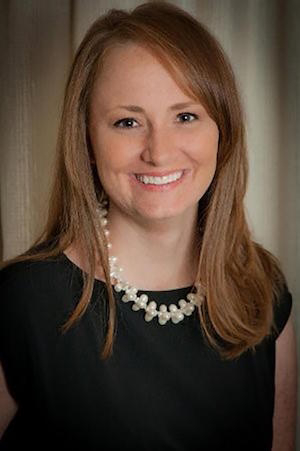
Rosanne Green, gardening social media influencer from Athens, will be Stephen F. Austin State University’s July Theresa and Les Reeves Lecture Series guest speaker. She will present “Raising the next generation of horticulturalists, entomologists and master gardeners” at 7 p.m. July 13 in the Brundrett Conservation Education Building at the Pineywoods Native Plant Center.
June 28, 2023 - Stephen F. Austin State University’s SFA Gardens will host the monthly Theresa and Les Reeves Lecture Series at 7 p.m. July 13 in the Brundrett Conservation Education Building at the Pineywoods Native Plant Center.
Rosanne Green, gardening social media influencer, will present “Raising the next generation of horticulturalists, entomologists and master gardeners.”
In her lecture, Green explores where the next generation of horticulturalists, entomologists and master gardeners will come from and emphasizes it will be children who are influenced by their parents, grandparents and educators. This presentation will feature specific ideas for how to inspire, educate and influence the next generation.
Green is a full-time strategy and business consultant with LPL Financial and has over 20 years’ experience in the finance industry. In her free time, the hobby-gardener turned gardening social media influencer with over 30,000 Instagram followers (@GreenishTexas), enjoys educating, inspiring and entertaining others about the concepts of growing their own organic food and flowers in a backyard garden.
Based in Athens, Green cultivates a 2,000-square-foot vegetable and flower garden. Her garden and love of educating other like-minded gardeners through social media was recently featured in the May/June 2023 issue of Texas Gardener magazine.
The Theresa and Les Reeves Lecture Series is held the second Thursday of each month and includes a rare plant raffle after the program. The lecture is free and open to the public, but donations to the lecture series fund are always appreciated.
Parking is available at the PNPC, 2900 Raguet St., or Raguet Elementary School, 2708 Raguet St.
For more information, email sfagardens@sfasu.edu.
June 27, 2023 — Stephen F. Austin State University’s SFA Gardens will host a houseplant and succulent summer sale from 8 a.m. to 1 p.m. July 8 at the Pineywoods Native Plant Center greenhouse, located at 2900 Raguet St.
The sale will feature succulents, cacti and houseplants of various varieties, plus a small assortment of a few other plant types. This sale will be a much smaller event than the SFA Gardens semi-annual plant sales and will offer a specific selection of plants intended for indoor or special care.
Limited parking will be available at the PNPC. Visitors are encouraged to arrive at or after 8 a.m. when the doors will open.
For more information, visit the SFA Gardens Facebook page, call (936) 468-4404 or email sfagardens@sfasu.edu.
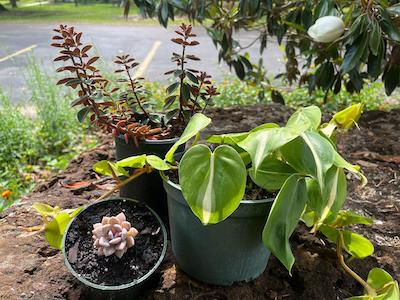
Stephen F. Austin State University’s SFA Gardens will host a houseplant and succulent summer sale from 8 a.m. to 1 p.m. July 8 at the Pineywoods Native Plant Center greenhouse. The sale will feature succulents, cacti and houseplants of various varieties, among others.
June 2, 2023 — Stephen F. Austin State University has partnered with Panola College to offer the Panola Pathway with SFA, which will allow students to expand on their associate degree to eventually earn a Bachelor of Science in Interdisciplinary Studies from SFA.
The program, slated to begin its inaugural courses this summer, is pending approval from the Texas Higher Education Coordinating Board and the Southern Association of Colleges and Schools Commission on Colleges.
In this unique distance-learning education program, students who earned an Associate of Arts in teaching from Panola College will enroll in SFA courses taught online or on the Panola campus to eventually earn a BSIS from SFA. This program will also prepare students to sit for the Texas teaching certification exams.
“It’s important to create pathways toward teacher certification that remove barriers for students,” said Dr. Jannah Nerren, chair of SFA’s Department of Education Studies. “There is a nationwide teacher shortage that creates an urgency for bolstering the teacher pipeline. We believe in the power of a university-prepared teacher and want to work with our community college partners to provide pathways that produce high-quality teachers while understanding and creatively overcoming some of the barriers students face.
Though primarily online, the program will offer at least one face-to-face course per semester on the Panola Collage campus beginning fall 2023. Students will choose between two concentrations — early childhood through grade 6 or 4-8 middle-level education. Students will also have six different areas of content focus to choose from, including core subjects EC-6; core subjects 4-8; English, language arts and reading 4-8; math 4-8; science 4-8; and social studies 4-8.
“Students will have the advantage of a distance education program with face-to-face support in their home area,” Nerren said. “There are many community college and university partnerships, but this one is unique in that SFA classes and certification testing support will be offered on the Panola College campus.”
Throughout the program, students will be exposed to field-based experiences and complete field hours, which are hours spent in Texas prekindergarten through 12th grade classrooms to provide hands-on, authentic experience with teaching.
Interested students will need to apply to SFA through the Apply to SFA page. Then, they will be prompted to send an email to Dr. Susan Reily, associate professor and program coordinator, at reilys@sfasu.edu indicating the certification path they are interested in pursuing and request additional information about applying for the Panola Pathway to SFA program. Once completed, candidates can begin enrolling now in summer 2023 online courses.
For more information, visit gosfa.com/panolapathway or contact Dr. Elizabeth Gound, assistant professor and program advisor, at goundeliza@sfasu.edu.
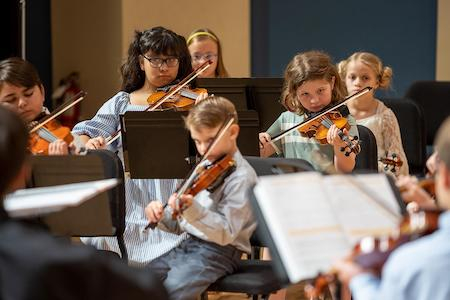
Registration is still open for summer lessons, camps and classes in the Music Preparatory Division in the SFA School of Music. Contact Music Prep Director Alba Madrid at musicprep@sfasu.edu or call (936) 468-1291 for information.
May 25, 2023 – There’s still time to register for summer lessons and camps offered by the Music Preparatory Division of the Stephen F. Austin State University School of Music.
The always popular Kindermusik program for young children is offered this summer in two sessions to allow flexibility for families to plan their summer schedules, according to Alba Madrid, director of Music Prep programming. The mixed age class for children birth to 4 years is June 15 to July 6 for Session 1 and July 13 through Aug 3 for Session 2. Mixed age classes are designed for little ones at different developmental levels to make music together with other family members. “Families build connection, grownups learn ideas for music exploration and play at home, and there’s room for everyone to grow,” Madrid said. Classes meet on Thursdays at 5:15 p.m. at the Prep House, and cost is $70.
The Kindermusik foundation classes for birth to 1-year-old children, also running June 15 through July 6, are all about exploring and reacting to new sounds, objects and movements. Parents and caregivers heighten connections with their babies by learning bonding techniques. Foundation class meets on Thursdays at 4 p.m., and cost is $70.
For string musicians hoping to take their playing to the next level, Music Prep offers its Strings Project summer camp. Designed for elementary age musicians who play violin, viola, cello or double bass, this program offers a fun and intensive learning experience. Participants will improve their skills, musical knowledge and performance abilities with expert instruction and have the opportunity to participate in recreational activities. The camp is open to all students with at least one year of string instrument experience. The goal of the camp is to create a supportive and inspiring environment where musicians can develop their talents, make new friends, and have fun. The camp is from 8 a.m. to noon June 12 through 16 at the Music Prep building. Cost is $50.
Piano Improvisation Camp is designed for pianists who have at least three years of playing experience. Group classes will be held at the Prep House from June 19 to 23. The sessions will run from 9 a.m. to 2 p.m., starting with a group class, followed by a one-hour lunch break, and ending with two hours of private lessons and individual practice. The camp aims to teach pianists the basics of church music, contemporary lead sheet reading, jazz, rag and blues. Participants will also learn how to perform with other musicians. Cost is $150.
Way Cool Keyboarding will be offered in two camps June 26 through 29. Morning sessions for kids ages 6 to 10 are 9:30 to 11 a.m., and afternoon sessions for students 11 through 17 are 1 to 2:30 p.m. in the digital piano lab, Room 223 of the Boynton Building on the SFA campus. The younger group sessions provide positive musical and non-musical benefits, including the development of concentration and listening skills. Pre-teen and teenager students, with little or no previous musical background, can learn both chord chart and traditional note reading to make cool piano music in a short amount of time. Cost is $100.
Intro to Musical Moments for Adults is for students age 18 and up. The class is offered at 6 p.m. Tuesdays in June, including June 6, 13, 20 and 27, in the Boynton Building piano lab. Students will experience a stress-free enjoyable environment where they will learn to read music, play chords, and create music right away at the piano in a group setting. Cost is $100.
Private lessons will also be offered in violin, viola, cello, bass, piano, flute and voice.
Depending on the camp or lessons chosen, summer sessions begin Monday, May 29, and continue through Friday, Aug. 4.
Registration forms and more information, including detailed schedules and private lesson tuition, can be accessed at sfamusicprep.com/summer-23/, or contact Music Prep Director Alba Madrid at musicprep@sfasu.edu, or call (936) 468-1291. The Music Prep House is located at 3028 Raguet St.

May 25, 2023 – Stephen F. Austin State University is doing some needed maintenance to its downtown art gallery, The Cole Art Center at The Old Opera House. SFA workers will clean the outside brick and remove deteriorating grout to apply new material and sealant to prevent seepage that has caused some damage to interior upstairs offices. The overhead entry awing will also be repaired and restored to prevent leakage. As a result of the work, Cole Art Center will be temporarily closed for about two weeks. When work is completed, patrons will still have opportunity to view the Texas National exhibition through June 30.
May 15, 2023 - Stephen F. Austin State University students received monetary awards and scholarships — many donated by Nacogdoches-area financial institutions — during an April 19 ceremony.
Award and scholarship recipients were chosen by faculty members from the SFA Rusche College of Business’ Department of Economics and Finance.
“Students were selected based on their academic achievement in their coursework, engagement in research projects, participation in conferences, and pursuit of their future career goals — whether employment, entrepreneurship or graduate study,” said Dr. Mikhail Kouliavtsev, chair of the department.
Nathan Hanzelka, finance senior from Eastland, received the Entrepreneurship Award, and Dan Nguyen, finance junior from Vietnam, received the Portfolio Management Award — both of which were sponsored by Buchanan Wealth Management.
Other achievement award recipients included Sergio Diaz-Montiel, finance senior from Lufkin, who received the Asset Liability Management Award sponsored by Citizens 1st Bank, and Tina Packard, finance and banking senior from Nacogdoches, who received the Financial Institutions Award sponsored by Cadence Bank.
The Economics Reading Group presented Alexander Ornelaz, sports business senior from McKinney, with the Economic Pursuits Award; Barret Williams, economics freshman from Wake Forest, North Carolina, with the Economic Interest Award; and Emily Herrell, social work senior from Arp, with the Economics Reading Group Officer Award. All three awards were sponsored by the Charles Koch Foundation.
The High-Ranking Economics Major Award, sponsored by the Charles Koch Foundation, went to Preston Sahs, Frisco senior. The High-Ranking Finance Junior and High-Ranking Finance Senior awards, both sponsored by Southside Bank, went to Robert Leslie of The Woodlands and Diaz-Montiel, respectively. Tom Nguyen, a junior from Vietnam, received the High-Ranking Banking Major Award from SFA’s Chadwick Family Banking Program.
Spencer Carmichael of Spring received the Outstanding Economics/Finance Graduate Award, and Ngoc Hoang, finance sophomore from Vietnam, and Salma Ben-Salah, economics exchange student from Tunisia, received the Undergraduate Scholar Award. All three awards were sponsored by the ECON 3339 Packet Fund.
The Dustin C. Harrison Memorial Scholarship was presented to Tristen Adams, finance senior from Lufkin. The scholarship benefits finance majors who display upstanding character and maintain a 3.0 GPA or higher.
Harrison graduated summa cum laude from SFA in 2018 with a degree in finance and then worked as an analyst at Ayco Goldman Sachs in Dallas before his death in March 2021. Ronnie and Chloe Canaan-Chapman, both 2018 SFA graduates and friends of Harrison, established the scholarship.
For more information on these awards and SFA’s Department of Economics and Finance, visit sfasu.edu/ecofin.
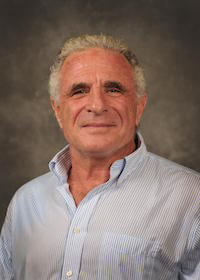
The Stephen F. Austin State University Board of Regents promoted Piero Fenci, professor of art, to professor emeritus at its May 10 meeting.
May 11, 2023 - During a one-day special-called meeting, the Stephen F. Austin State University Board of Regents selected Kirksey Architecture to create a new forestry, agriculture and interdisciplinary facility and promoted Piero Fenci, professor of art, to professor emeritus.
Regents awarded a contract for an initial amount not to exceed $5.6 million to architectural engineering firm Kirksey Architecture for designing SFA’s new forestry, agriculture and interdisciplinary facility at the Todd Agricultural Research Center. Kirksey Architecture built the Cole STEM Building and is overseeing renovations to the Griffith Fine Arts Building.
In 2021, the 87th Texas Legislature approved $45 million in capital construction assistance projects funding for SFA to build a new forestry and agriculture facility. As part of system affiliation, The University of Texas System offered another $35 million for a total of $80 million to build SFA’s new forestry, agriculture and interdisciplinary facility.
Also during the board meeting, Dr. Steve Westbrook, SFA president, presented the recommendation promoting Fenci to professor emeritus.
“It would really be impossible to measure the impact that Piero has had on hundreds of students during his time here,” Westbrook said.
Fenci, who is a Micky Elliott College of Fine Arts Dean’s Circle Endowed Professor award recipient, has been with SFA since 1975 and has distinguished himself as both an artist and an educator. His ceramic vessels have been featured in Ceramics Monthly, American Ceramics, The Contemporary Potter, and Clay and Glazes for the Potter. In 2004, he founded the first university program in contemporary ceramic art in the history of northern Mexico at la Universidad Autonoma de Chihuahua in Chihuahua City, and he continues to travel there to mentor the program.
Fenci has earned an international reputation as a ceramist, exhibiting his work from coast to coast and in Italy, Russia and Mexico. He was named “Texas Master” by the Houston Center for Contemporary Craft, becoming the fourth person (and the first ceramist) in the state to be honored with the award.
“Thank you to the board and the university for making it possible for me to have a glorious career here in Nac,” said Fenci, who is scheduled to retire Aug. 31.
“I am not leaving, though,” he added. “I love this emeritus position because I can continue to mentor my students. I am here and will continue to be supportive of you all. Just give me a holler.”
Fenci lives and shares a studio with his sculptor wife, Elizabeth Akamatsu. His work is represented in private and public collections, including the Museum of Fine Arts, Houston; the Schein-Joseph International Museum of Ceramic Art, Alfred, New York; and in the Tyler Museum of Art, Tyler. His latest exhibition, “Grand Voyage: The Art of Piero Fenci,” runs through September at Dallas’ Museum of Biblical Art.
For more information, visit sfasu.edu/regents.
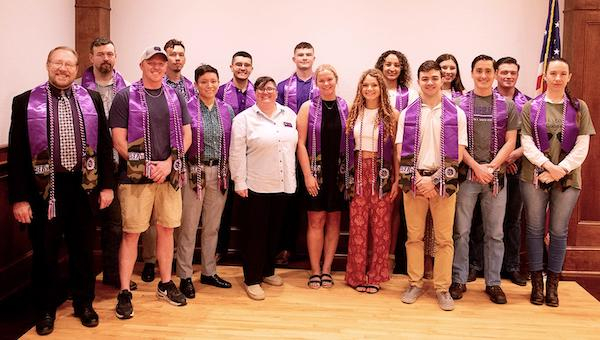
Fifteen veterans, those currently in active duty, reservists, members of the U.S. National Guard and those commissioned in ROTC pose with their regalia during Stephen F. Austin State University’s inaugural Veterans Resource Center graduation luncheon May 3. The recognition included a presentation of their graduation stole; a red, white and blue honor cord; and a VRC challenge coin.
May 10, 2023 - Stephen F. Austin State University’s Veterans Resource Center hosted its inaugural veteran’s graduation luncheon Wednesday, May 3, in the Baker Pattillo Student Center Twilight Ballroom to honor military-connected students graduating this month.
This is one of several new initiatives begun by Stesha Colby-Lynch, the newly appointed VRC program director, who said she is working to build up a veteran support network on campus.

A graduation stole, honor cords and challenge coins were given to 15 honorees during Stephen F. Austin State University’s inaugural Veterans Resource Center graduation luncheon.
The luncheon recognized 15 veterans, those currently in active duty, reservists, members of the U.S. National Guard and those commissioned in ROTC. The recognition included a presentation of their graduation stole; a red, white and blue honor cord; and a VRC challenge coin. Additionally, military-connected faculty and staff were in attendance, along with the families and chosen mentors of the recipients. Mentors also were presented a VRC challenge coin.
The VRC coin is a two-inch metal coin with the SFA logo on one side and the VRC logo on the other. Traditionally, similar coins are given during special events and given by high-ranking officials in recognition of good work.
“I felt that it was important to have a more ceremonious way to present them with their regalia and celebrate their accomplishments with family and friends,” Colby-Lynch said. “I also felt that it was important for the students to be able to nominate a mentor to be honored as well.”
The ceremony began with a brief introduction by Colby-Lynch, who then presented graduates with their regalia. After the ceremony, attendees were free to eat and mingle.
Students who chose not to participate could pick up their regalia at the VRC the week of graduation. Online students and those in satellite locations had regalia mailed to them.
For more information about the VRC, contact Colby-Lynch at Stesha.Colby-Lynch@sfasu.edu.
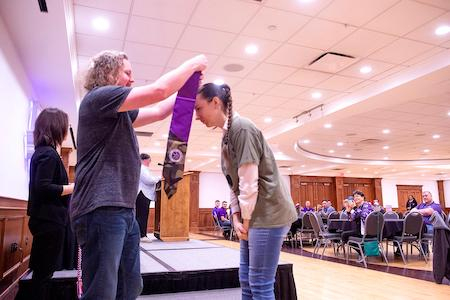
Evelyn McAdam, a Marine veteran graduating magna cum laude with a Master of Arts in photography, is given her graduation stole during Stephen F. Austin State University’s inaugural Veterans Resource Center graduation luncheon Wednesday, May 3. Fifteen veterans, those currently in active duty, reservists, members of the U.S. National Guard and those commissioned in ROTC were recognized during the event.
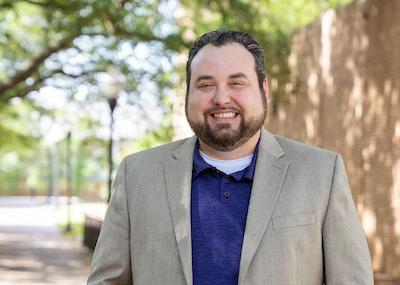
Chris Cotton, university archives and research coordinator at Stephen F. Austin State University, is one of eight recipients of this year’s President’s Achievement Award.
May 9, 2023 — He collects, organizes, indexes and safeguards Stephen F. Austin State University’s history through its archival collections. He helps students, faculty, staff and community members conduct in-depth research on East Texas. He interviews alumni about their experiences at SFA. He speaks with donors on topics ranging from East Texas lumber towns to World War II tanks.
All of this and more has earned Chris Cotton, university archives and research coordinator at SFA’s East Texas Research Center in the Steen Library, one of eight President’s Achievement Awards presented this year.
“It is such an honor to be a recipient, and it is really rewarding to know that my colleagues think so highly of me,” Cotton said.
This year, Cotton is extra busy serving on the committee that’s setting the scene for SFA’s centennial celebrations.
“The university’s upcoming centennial is something that is very exciting to be able to participate in directly,” he said. “As a historian and archivist, I firmly believe an understanding and recognition of the past will help SFA successfully move forward for our next 100 years.”
From 2016 to 2018, Cotton worked as an ETRC graduate assistant. In 2019, he was hired as the center’s archives associate. By 2022, he was the university archives and research coordinator managing ETRC’s student workers, several of whom have gone on to work in libraries or pursue a graduate education in library science.
The secret to his success is customer satisfaction, according to one of his nominations.
“Chris gives every researcher his maximum attention. Whether it is a student, faculty member or community member, I am impressed by the lengths to which he goes each and every time to make sure they get the most from their archival experience. He is adept at figuring out exactly what a person is looking for and then finding the information in the depths of the ETRC.”
Cotton said he believes that connecting ETRC patrons with the past in a tangible, hands-on way through archival materials can help them more fully connect with the past.
“In addition, helping our patrons find that missing piece of information or that story that brings all of their research together is incredibly rewarding,” he said.
Cotton works closely with professors to design archival visits and projects to improve undergraduate student learning and retention. For example, he has collaborated with Dr. Michael Martin, SFA professor of English and creative writing, for the past two years to help students with their projects in Martin’s New-Lumberjack Experience honors course.
“The success of these projects and my students has greatly depended on all the time, energy and effort of Chris Cotton,” Martin said. “The students sense his interest, and they engage him every time they are in the archives.”
For this class, Cotton takes time from his regular duties to introduce students to the archives, help them choose research topics and work with them throughout their entire projects.
“Each day that my class is in the library, Chris makes himself available to the students, always looking for new and additional materials they may request,” Martin said. “After the students have gathered the research and built their posters, Chris attends the Honors Research Symposium, listens to the students practice their talks, and offers encouragement and suggestions.”
Cotton has become a go-to staff member when students need help in general, according to another nomination.
“Random students have started to come to Chris to get help with various types of research outside the archival realm or ask him to read their papers before they turn them in.”
Cotton said he’s happy to help anyone working on historical topics.
“The best part of my job is being surrounded by history every day and getting to share that history with the community.”








